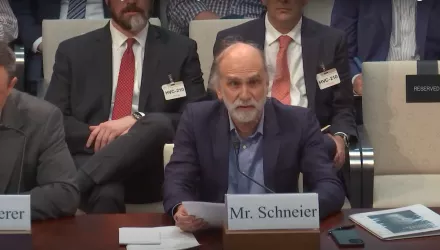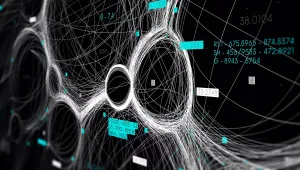Jenny Jun
Jenny is a nonresident fellow at the Atlantic Council’s Cyber Statecraft Initiative and PhD Candidate at Columbia University’s Department of Political Science. Her research focuses on building a systematic logic of cyber coercion using formal models, identifying conditions under which certain cyber capabilities can or cannot be used to coerce adversaries. She is currently building a series of models on ransomware and the use of encryption for coercive effects. Jenny also conducts research on North Korea and security issues in East Asia. She is a co-author of the 2015 Center for Strategic and International Studies (CSIS) report North Korea’s Cyber Operations: Strategy and Responses, published by Rowman & Littlefield. She was a 2019 Summer Associate at RAND, where she conducted research on North Korea’s social media-based disinformation campaigns. Jenny received her MA and BS each from the Security Studies Program (SSP) and the School of Foreign Service (SFS) at Georgetown University. She has presented her work on North Korea’s cyber operations at the Brookings Institution, CSIS, and the School of International and Public Affairs (SIPA) at Columbia University, and has provided multiple government briefings and media interviews on the topic.
Heeu Millie Kim
Heeu Millie is a Master of Science in Foreign Service (MSFS) candidate at Georgetown University and a member of the Korea Project's North Korean Cyber Working Group. As a Graduate Research Analyst at the Center for Security and Emerging Technology, her research focuses on applications of artificial intelligence, cybersecurity, information operations, and digital connectivity in the Asia-Pacific region. She previously conducted research on North Korea and security in East Asia for the Korea Chair at the Center for Strategic and International Studies (CSIS) and the Asian Studies Program at Georgetown University. Millie received her B.S. in International Politics and Mandarin Chinese from the School of Foreign Service at Georgetown University, where she also spent semesters in Beijing, China and Copenhagen, Denmark. She is proficient in Mandarin Chinese and Korean.
June Lee
June Lee is Program Coordinator of the Tech and International Affairs Program at the Carnegie Endowment for International Peace. As program coordinator, June oversees the Tech Program’s research initiatives and events, and supports research on cyber attribution and international norm-building around state conduct in cyberspace. She co-leads the Korea Project's North Korean Cyber Working Group and has previously worked at the Atlantic Council's Cyber Statecraft Initiative and the State Department. June graduated Phi Beta Kappa from Stanford University, studying international relations and computer science.
Steve Miller
Steve Miller is an incident response professional, threat intelligence analyst and researcher of adversary tradecraft, obsessed with finding human fingerprints in digital artifacts. Rather than the Who, What, or Why of a breach, he focuses on the How -- the TTPs or modi operandi of cyber threat actors. Steve recently joined Stairwell after eight years at Mandiant, where he built security operations centers around the world, conducted hundreds of intrusion investigations and, of course, chased down a lot of evil – work that directly led to the discovery of tons of new zero-days, APT malware families, and targeted attack campaigns. Prior to joining Mandiant, Steve conducted research and special projects for federal government agencies such as the U.S. Department of Homeland Security and the U.S. Department of State. He began his career in security working with the U.S. Army Intelligence and Security Command at the National Security Agency from 2002 to 2008. Steve holds a Bachelor of Science in Computer and Digital Forensics from Champlain College in Vermont. In his spare time, he makes noises on modular synthesizers and trains to become an Apex Legend.
Priscilla Moriuchi
Priscilla Moriuchi is a non-resident Fellow at Harvard's Belfer Center for Science and International Affairs and works in Security Engineering and Architecture at Apple. Ms. Moriuchi is an expert on state-sponsored cyber operations and Asia Pacific regional and cyber threats, and is a widely published researcher and commentator on national and cyber security issues. Her cutting-edge research on China, Russia, and North Korea has been featured in the New York Times, the Washington Post, the Wall Street Journal, and many others. Ms. Moriuchi was formerly the Head of Nation-state Research and the Principal Researcher at Recorded Future. Prior to joining the private sector, Ms. Moriuchi spent 12 years at the National Security Agency, most recently as the Enduring Threat Manager and top subject matter expert on East Asia and Pacific (EAP) cyber threats.
Saher Naumaan
Saher Naumaan is Principal Threat Intelligence Analyst at BAE Systems Applied Intelligence. She currently researches state-sponsored cyber espionage with a focus on threat groups and activity in the Middle East. Saher specialises in analysis covering the intersection of geopolitics and cyber operations, and regularly speaks at public and private conferences around the world, including SAS, Virus Bulletin, FIRST, and Bsides. Prior to working at Applied Intelligence, Saher graduated from King’s College London with a Master’s in Intelligence and Security, where she received the Barrie Paskins Award for Best MA dissertation in War Studies.
Alex O’Neill
Alex O’Neill is an Associate of the Korea Project and a MSc candidate in the Russian and East European Studies program at the University of Oxford. Previously, Alex served as Coordinator of the Korea Project, where he helped oversee all research initiatives and events, including the 2nd Harvard Korean Security Summit. Alex also co-leads the Korea Project's North Korea Cyber Working Group and heads a research initiative on the cyber relationship between Russia and North Korea. He earlier served as research assistant to Professor Matthew Bunn at the Belfer Center’s Project on Managing the Atom. He is fluent in English and Spanish and has advanced proficiency in Russian. Alex graduated cum laude from Yale College with a degree in European History.
Rachel Paik
Rachel Paik is a Development & Communications Associate at the Council of Korean Americans (CKA). Prior to joining CKA, she worked in fundraising and development at the Arms Control Association and was the former Grants & Programs Officer at Partnership for a Secure America. She is passionate about Diversity, Equity, and Inclusion, and has worked on various leadership development and advocacy programs on Capitol Hill and within the nuclear policy community. She is currently a research committee member of the Sejong Society of Washington D.C.
John Park
Dr. John Park is Director of the Korea Project at the Harvard Kennedy School’s Belfer Center. Dr. Park’s core research projects focus on nuclear proliferation, alliances, economic statecraft, North Korean cyber activities, and the political economy of the Korean Peninsula. He previously directed Northeast Asia Track 1.5 projects at the U.S. Institute of Peace in Washington, D.C. He advises Northeast Asia policy-focused officials in the U.S. government. Dr. Park earlier worked at Goldman Sachs and The Boston Consulting Group. His main publications include: “Stopping North Korea, Inc.: Sanctions Effectiveness and Unintended Consequences,” (MIT-Harvard study, 2016 – co-authored with Jim Walsh); “Assessing the Role of Security Assurances in Dealing with North Korea” in Security Assurances and Nuclear Nonproliferation (Stanford University Press, 2012). Dr. Park received his Ph.D. from the University of Cambridge. He completed his predoctoral and postdoctoral training at the Harvard Kennedy School.
Kirt Smith
Kirt Smith is an active member of the North Korea Cyber Working Group with the Korea Project. Previously, Kirt spent two and a half years working for the Congressional Research Service (CRS) in the Foreign Affairs, Defense, and Trade Division’s Asia Section where he supported Congressional committees, Members, and staff in developing legislative priorities for the Indo-Pacific region. Kirt earned his Master of Global Policy Studies from the Lyndon B. Johnson School of Public Affairs at the University of Texas – Austin and a Bachelor of Arts in French from the University of New Orleans. He is proficient in Mandarin Chinese and French, and has elementary proficiency in Korean, Thai, and Burmese.
Lauren Zabierek
Lauren Zabierek is the Executive Director of the Cyber Project at Harvard Kennedy School’s Belfer Center. She comes to this role as a 2019 graduate of the Kennedy School's mid-career MPA program. Lauren served as an intelligence officer in the United States Air Force at the beginning of her career. Later, as a civilian intelligence analyst with the National Geospatial Intelligence Agency (NGA) assigned to the Office of Counterterrorism, she completed three war zone deployments. Throughout her six years at NGA, she became a subject matter expert on Activity Based Intelligence (ABI) and served as an adjunct professor in ABI at the NGA college. After leaving NGA, she joined the cybersecurity threat intelligence startup Recorded Future, and was instrumental in building its Public Sector business practice. In her role as a Senior Intelligence Analyst, she fused intelligence methodologies with cybersecurity and machine learning technologies to help public and private sector customers improve their cyber posture. She also managed a team of analysts and worked alongside the Product Management and Training teams to improve her customers' experience with the software. A Gold Star Sister, Lauren is committed to supporting families of the fallen and has volunteered several times as a mentor with the Tragedy Assistance Program for Survivors (TAPS). She also co-founded the Recorded Future Women's Mentorship Initiative, helped to start a women's initiative at NGA, is a member of the NatSecGirlSquad, and is the co-founder of the online social media movement called #ShareTheMicInCyber, which aims to dismantle racism in cybersecurity and privacy. She is also a Visiting Fellow at George Mason University’s National Security Institute.


